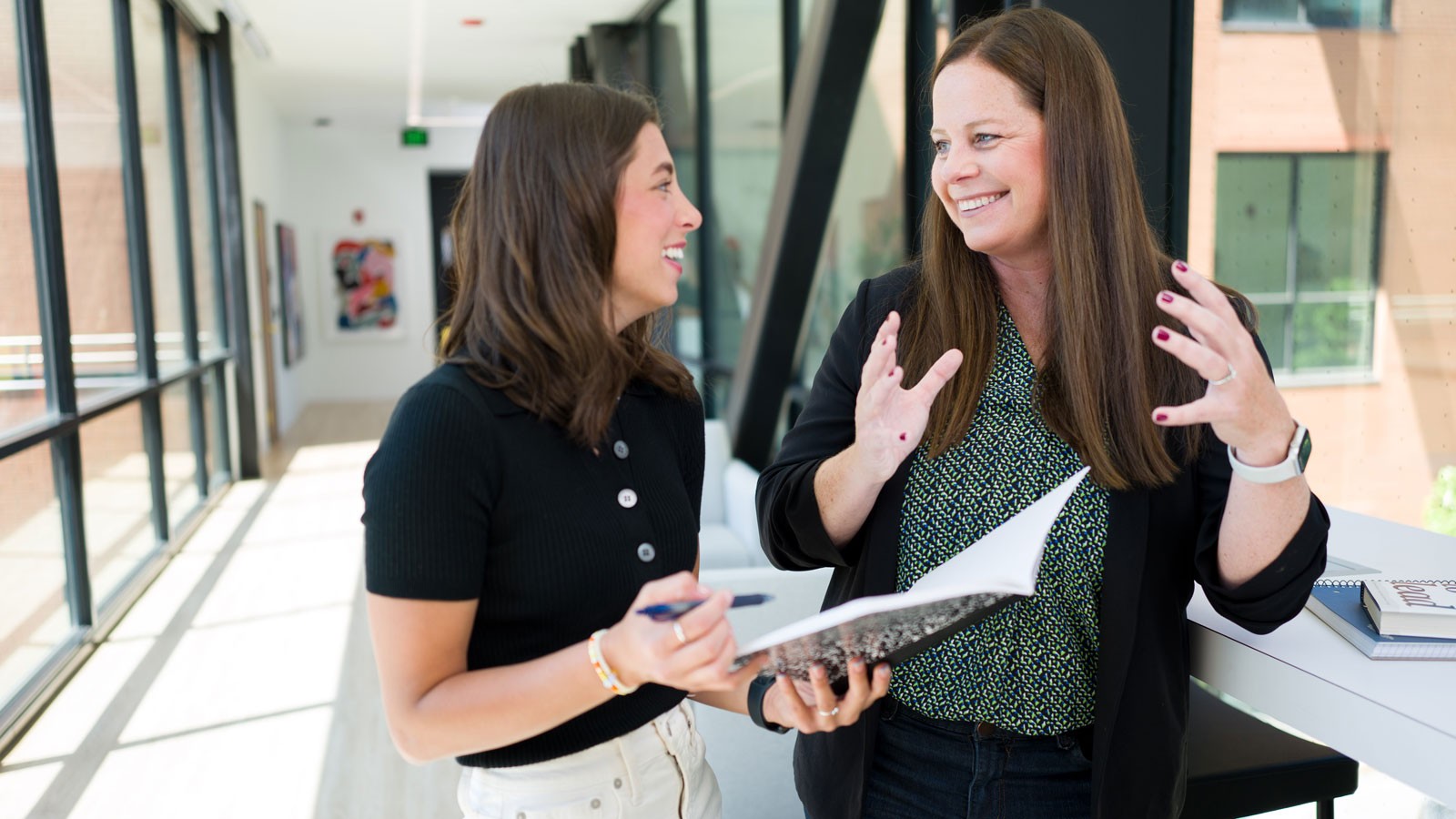Alzheimer's Disease & Dementia Research Center Celebrates 1st Anniversary, Seeks Participants
Research for the Sake of People
By Anna Sadler |
Beth Fauth, right, speaks with a student. (Photo Credit: USU/Levi Sim)
As Elizabeth Fauth, professor of Human Development and Family Studies at USU, began working on a collaborative effort to pursue state funding for a research center focusing on Alzheimer’s disease and dementia, she had many opportunities to reflect on the moments in her life that inspired her to work in gerontology and dementia care.
These moments all involved the people Fauth had met throughout her life who had been touched by dementia: the woman with dyed black hair who had Alzheimer’s disease and the ability to drink six coffee creamer packets in a row before Beth could serve her coffee while working in assisted living; the hardworking mom who juggled a family, a career, and visits to her mom in a care facility; the loving husband who was determined to learn how to do his wife’s hair for her as she began to exhibit early signs of dementia.
Fauth’s desire to research dementia and how it impacts individuals and caregivers has deep roots in her desire to help people live fuller, richer lives, regardless of the challenges they may face. Now the director of the Alzheimer’s Disease and Dementia Research Center (ADRC) at USU, Fauth is celebrating the center’s successes in its first year and looking forward to a rich future of research, education and service.
“I’m so proud of this team we’re pulling together in Alzheimer’s research and support,” Fauth said. “We have always had the goal of doing important research not just for the sake of research, but for people living with dementia and their families. Now that the ADRC is operating with key team members in place, we are even more poised to understand Alzheimer’s disease and help the dementia community in Utah.”
In its first year, the ADRC distributed $375K to support new and ongoing dementia research. Fifteen faculty across multiple disciplines at USU are actively affiliated with the center. Many are creating research opportunities for students at USU, delivering research presentations to national societies and state nonprofits, and publishing articles in scientific journals.
As it moves into its second year, the ADRC will continue to work to understand the pathology of dementia-related diseases, support the improvement and development of resources for individuals with dementia and their caregivers, and contribute to the education of individuals and policymakers.
Innovative research on Alzheimer’s disease and related dementias remains the center’s primary focus. While multiple projects are underway, two research studies through the ADRC are currently seeking participants.
Ongoing Research Opportunities at the ADRC
Assessing a self-guided online Acceptance and Commitment Therapy program for dementia caregivers
Acceptance and Commitment Therapy (ACT) is an action-oriented therapy method that focuses on acceptance of thoughts and feelings and commitment to act in alignment with personal values. It has been shown to be an effective therapy for depression and anxiety, chronic pain, and certain disorders, and USU researchers are now examining its effectiveness in an online format for caregivers of people with dementia.
ACT for Caregivers is a web-based, self-paced program that was created by researchers at USU. Through the program, caregivers learn about dementia, develop research-based skills to cope with distress, and practice focusing on what matters most to them. ACT for Caregivers is accessed entirely online using a computer, smartphone, or any device with internet access, making it highly accessible for those in areas with limited access to mental health resources. The course consists of six 30- to 45-minute modules completed over the course of four weeks, and users can move through the course at their own pace.
Researchers are currently recruiting individuals to try ACT for Caregivers. Participants should be currently caring for someone with Alzheimer’s disease, dementia, or memory loss, but they do not have to be living with the person with dementia to participate.
For more information on the study or to see if you qualify to participate, contact research coordinator Jacob Gossner at ACTforCaregivers@usu.edu or 435-797-1715.
Researching the effects of hearing aid use on cognition in older adults with hearing loss
Naveen Nagaraj, assistant professor in Communicative Disorders and Deaf Education at USU, is studying the effects of hearing aid use on cognition in older adults with hearing loss. Age-related hearing loss is recognized as a risk factor for dementia. While prior studies have suggested that hearing aids are beneficial because they improve social engagement (which indirectly improves cognition), Nagaraj is seeking to gather neurophysiological evidence that supports these observations.
To assess the cognitive and neurophysiological benefits of hearing aids, Nagaraj and his team will conduct a study using functional near-infrared spectroscopy, which is a relatively low cost, non-invasive and portable method of assessing brain activity. The team will assess changes in neural connectivity between different parts of the brain as a function of wearing hearing aids.
The team’s long-term plan is to understand the social, cognitive and neural benefits of increased access to hearing aid interventions in rural areas. They are currently recruiting individuals over the age of 60 with hearing loss who have not used hearing aids previously to participate in their research. For more information, email sound.science@usu.edu or call 435-797-0714.
WRITER
Anna Sadler
PR Specialist & Program Coordinator
Alzheimer's Disease & Dementia Research Center
anna.sadler@usu.edu
CONTACT
Alicia Richmond
Director of Public Relations & Marketing
Emma Eccles Jones College of Education & Human Services
alicia.richmond@usu.edu
TOPICS
Research 879stories Health 309stories Disease 51stories Alzheimer's Disease 26storiesComments and questions regarding this article may be directed to the contact person listed on this page.







